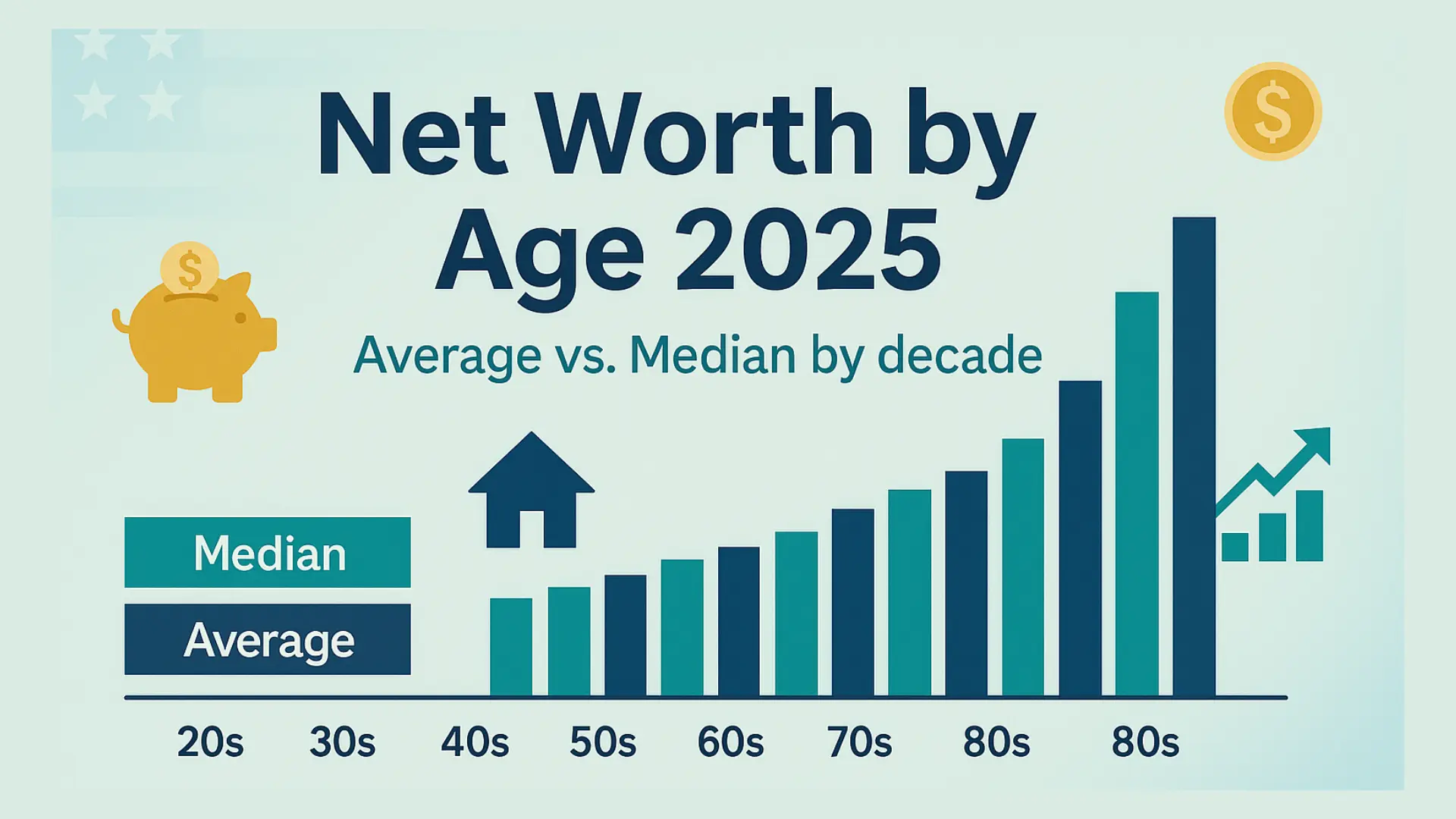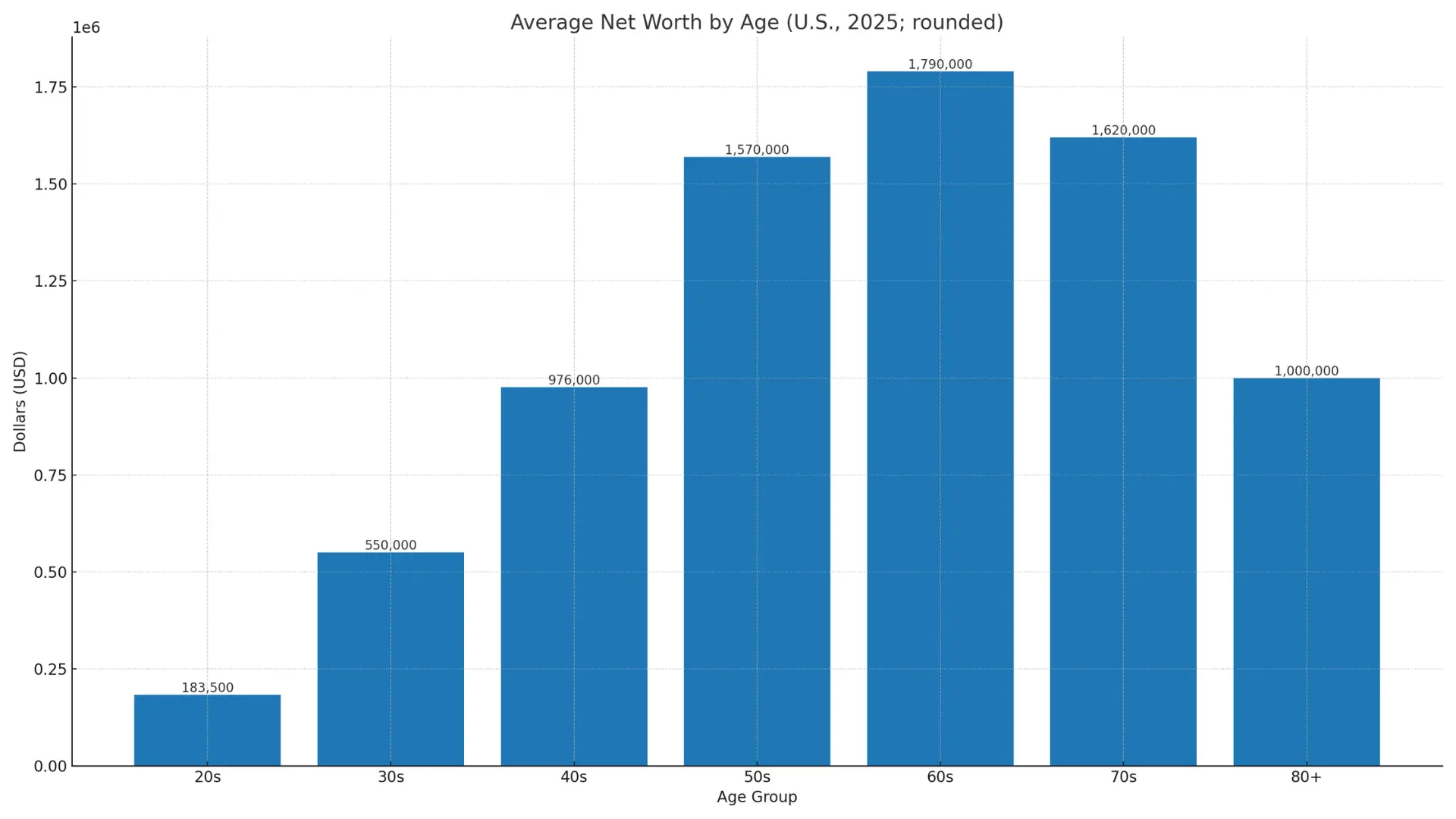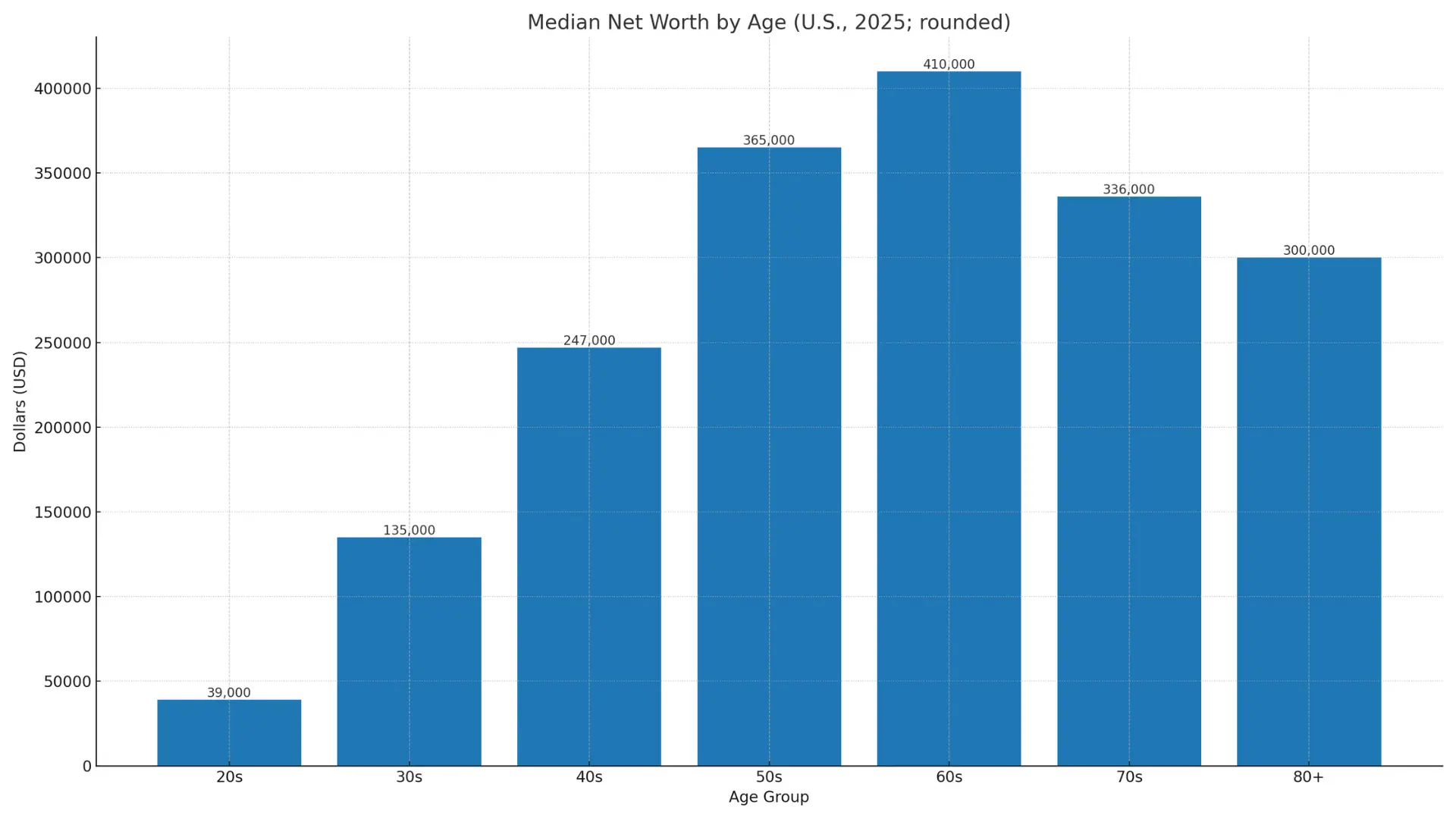Net Worth by Age in the USA 2025: Average vs Median Benchmarks by Decade
Published on
Updated on

Understanding how your net worth compares to national net worth by age benchmarks is a helpful reality check. Net worth equals what you own minus what you owe. It usually rises through working years, peaks around early retirement, then flattens or declines as savings are used. This 2025 edition summarizes average net worth by age and median net worth by age for each decade from your 20s through your 80s, so you can see how you stack up and where to focus next.
Average vs median net worth
- Average net worth is total wealth divided by the number of households. It is pulled up by very wealthy outliers.
- Median net worth is the midpoint. Half of households have more and half have less. It is a better gauge of the typical family.
- Use both together. Average shows the overall wealth landscape. Median shows where most people actually are.
Why look at both average and median net worth?
The average (mean) net worth is the total wealth divided by the number of households, while the median net worth is the midpoint – half of households have more, half have less. The average net worth is always much higher than the median, because a small number of extremely wealthy households lift the average. For example, across all ages the average U.S. household’s net worth is about $1.06 million, whereas the median net worth is around $192,700. The median is a more representative measure of a typical family’s wealth because it isn’t skewed by billionaires. However, the average is still useful to understand overall wealth in the economy and the degree of inequality. In the breakdowns below, we include both median and average net worth by age – the median shows what the “typical” household has accumulated, and the average indicates the broader wealth including top earners. Both metrics together give a fuller picture of “net worth by age” in the USA.
Methodology note
The most recent national source is the Federal Reserve Survey of Consumer Finances. Its age bands are Under 35, 35 to 44, 45 to 54, 55 to 64, 65 to 74, and 75 plus. To present net worth by age in decades:
- 20s uses the Under 35 band as the closest proxy
- 30s maps to 35 to 44
- 40s maps to 45 to 54
- 50s maps to 55 to 64
- 60s maps to 65 to 74
- 70s uses the 75 plus band as the nearest proxy for late 70s
- 80s and above are discussed qualitatively, since the 75 plus band blends late 70s and 80s
Dollar values are rounded to the nearest thousand.


Net worth by age, decade by decade
20s
- Median net worth: about 39,000 dollars
- Average net worth: about 183,500 dollars
- What this means: Most twenty-somethings are just getting started. Lower incomes, student debt, and limited time to compound savings keep the median modest. The average is higher because a small minority have unusually large assets early on.
30s
- Median net worth: about 135,000 dollars
- Average net worth: about 550,000 dollars
- What this means: Career growth, home purchases, and steady 401(k) contributions accelerate wealth. The spread between average and median widens as some households cross seven figures while many are still building.
40s
- Median net worth: about 247,000 dollars
- Average net worth: about 976,000 dollars
- What this means: Peak earning years plus compounding investments and home equity drive net worth higher. This is a critical decade to eliminate high-rate debt and stress test retirement savings.
50s
- Median net worth: about 365,000 dollars
- Average net worth: about 1,570,000 dollars
- What this means: Net worth often reaches a high point before retirement as mortgages shrink and portfolios mature. Use catch-up contributions, build cash buffers, and firm up withdrawal plans.
60s
- Median net worth: about 410,000 dollars
- Average net worth: about 1,790,000 dollars
- What this means: This group holds the highest average net worth. Many households have paid-off homes and sizable retirement accounts. Risk management, taxes, and sequence-of-returns planning matter as withdrawals begin.
70s
- Median net worth: about 336,000 dollars
- Average net worth: about 1,620,000 dollars
- What this means: Net worth typically plateaus or declines as retirees draw on savings and face higher health costs. The gap between average and median persists because a subset retain very large estates.
80s and above
- Median net worth: roughly 300,000 dollars is a reasonable guide using the 75 plus band as context
- Average net worth: still above 1,000,000 dollars for many due to affluent outliers
- What this means: Most retirees rely on a mix of Social Security, pensions, and systematic withdrawals. Estate planning, long-term care, and preserving comfort become primary goals.
How to use these benchmarks
- Compare to the median for your decade. If you are near your decade’s median, you are tracking the typical household.
- Watch your trend line. Net worth should generally rise through your 20s to 60s, then level or gently decline as you spend in retirement.
- Control the controllables. Raise your savings rate, invest consistently, avoid high-interest debt, and keep housing and lifestyle inflation in check. These levers move net worth more than market timing.
Key takeaways
- Net worth by age usually climbs with time and peaks in the early retirement years.
- The median is the better benchmark for most readers. The average shows the broader wealth picture and inequality.
- Hitting or beating your decade’s median is a solid milestone. Consistency in saving, investing, and debt management is what compounds into security later.
Sources

Disclosure: This list is intended as an informational resource and is based on independent research and publicly available information. It does not imply that these businesses are the absolute best in their category. Learn more here.
This article may contain commission-based affiliate links. Learn more on our Privacy Policy page.







